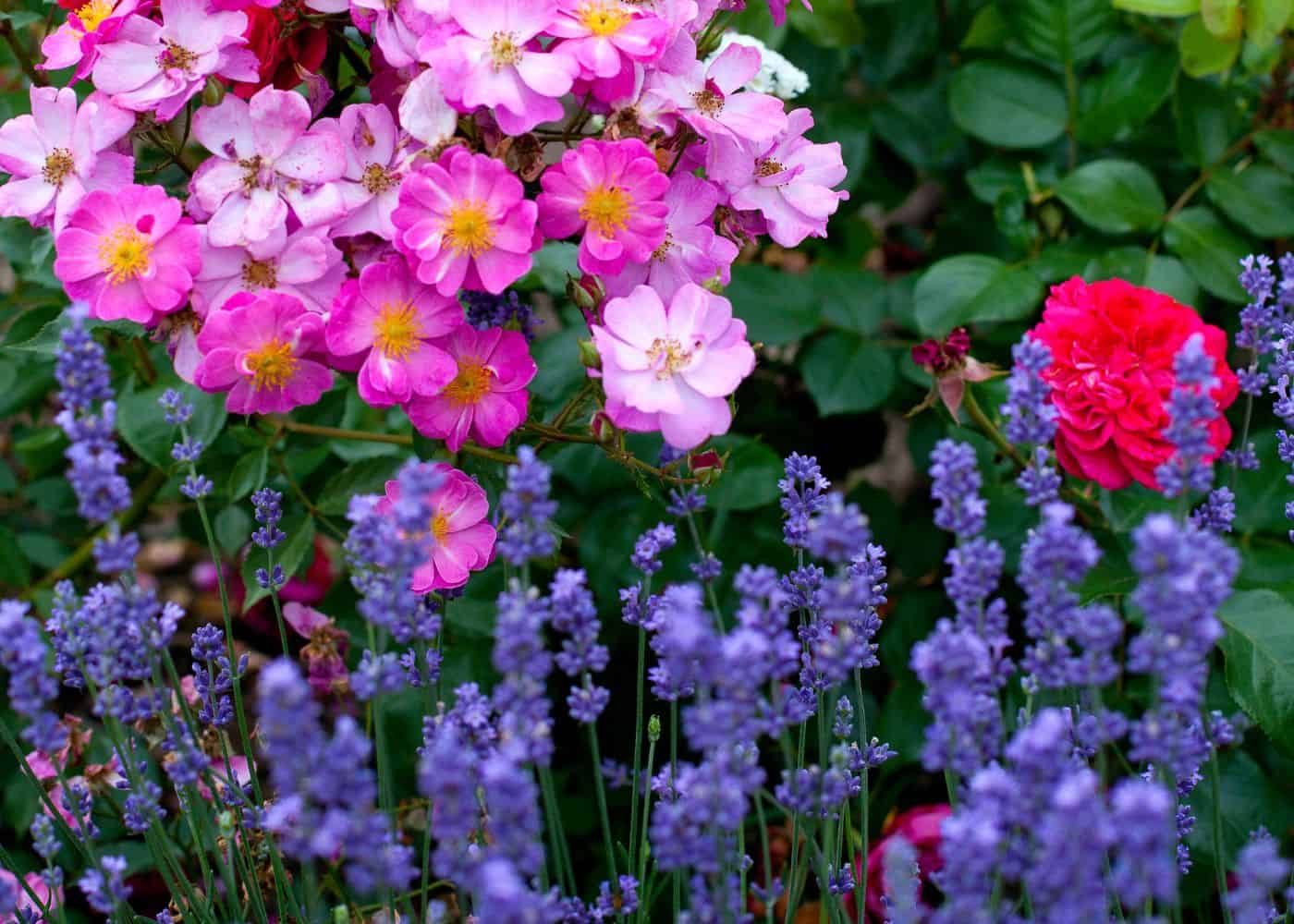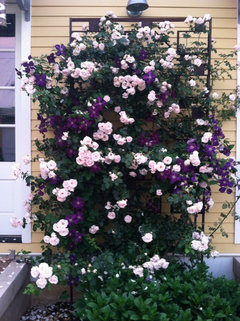The Best Rose Companion Plants For Pots
The Best Rose Companion Plants for Pots
Roses are one of the most popular flowers in the world, and for good reason. They're beautiful, fragrant, and come in a wide variety of colors. But if you're growing roses in pots, it's important to choose the right companion plants.
Companion planting is the practice of planting different types of plants together to benefit each other. When you choose the right companion plants for your roses, you can help to improve their health, deter pests, and attract pollinators.
In this blog post, we'll discuss the best rose companion plants for pots. We'll also provide some tips on how to choose the right companion plants for your specific needs.
Why Choose Companion Planting for Roses?
There are many benefits to companion planting with roses. Here are a few of the most important:
- Improved health: Companion plants can help to deter pests and diseases that can damage roses. For example, marigolds help to repel nematodes, which are microscopic worms that can attack rose roots.
- Attract pollinators: Pollinators, such as bees and butterflies, are essential for the reproduction of roses. Companion plants that attract pollinators can help to ensure that your roses are well-pollinated and produce more flowers.
- Increased biodiversity: Companion planting can help to increase the biodiversity of your garden. This is important for a number of reasons, including pest control and soil health.
Choosing the Right Companion Plants for Roses
When choosing companion plants for roses, there are a few things to keep in mind:
- Sunlight: Roses need full sun, so choose companion plants that also require full sun.
- Water requirements: Roses need regular watering, so choose companion plants that have similar water requirements.
- Soil type: Roses prefer well-drained soil, so choose companion plants that also prefer well-drained soil.
- Pest and disease resistance: Choose companion plants that are resistant to the same pests and diseases that your roses are susceptible to.
Here are some of the best rose companion plants for pots:
- Marigolds: Marigolds are a great companion plant for roses because they help to repel nematodes. They also attract pollinators and add a splash of color to your garden.

- Lavender: Lavender is another great companion plant for roses. It helps to deter pests, attract pollinators, and improve the fragrance of your roses.
- Catmint: Catmint is a low-growing plant that is perfect for filling in the gaps around your roses. It attracts pollinators and helps to deter pests.
- Yarrow: Yarrow is a tall, upright plant that adds structure to your garden. It also helps to deter pests and attract pollinators.
- Alyssum: Alyssum is a low-growing, flowering plant that is perfect for edging your rose pots. It attracts pollinators and helps to improve the drainage of your soil.

- Pansies: Pansies are a cheerful, spring-blooming flower that is perfect for adding color to your garden. They attract pollinators and help to deter pests.
- Petunias: Petunias are a popular summer-blooming flower that is perfect for adding color to your garden. They attract pollinators and help to deter pests.
- Geraniums: Geraniums are a hardy, easy-to-grow plant that is perfect for adding color to your garden. They attract pollinators and help to deter pests.

These are just a few of the many great companion plants for roses. By choosing the right companion plants, you can help to improve the health, beauty, and productivity of your roses.
Roses are a beautiful and popular flower, but they can be susceptible to pests and diseases. Companion planting is a great way to help protect your roses and improve their overall health.
There are many different plants that can be companioned with roses, but some of the best include:
- Lavender: Lavender is a natural pest repellent that can help keep away aphids, spider mites, and other insects. It also has a lovely fragrance that will add to the beauty of your garden.
- Catmint: Catmint is another insect-repelling plant that can help to keep your roses healthy. It also attracts bees and butterflies, which will help to pollinate your roses and produce more blooms.
- Lady's mantle: Lady's mantle is a beautiful and easy-to-grow plant that can help to improve the drainage of your soil. This is important for roses, as they do not like to sit in wet soil.
- Tall growing pinks: Tall growing pinks add height and color to your garden, and they can also help to attract beneficial insects.
If you are looking for more information about rose companion plants in pots, I recommend visiting Garden Wiki. This website has a wealth of information on the topic, including a list of the best companion plants for roses, tips on how to plant them, and advice on how to care for them.
FAQ of rose companion plants in pots
FAQs about Rose Companion Plants in Pots
1. What are the benefits of planting companion plants with roses?
There are many benefits to planting companion plants with roses. Some of the most common benefits include:
- Attracting beneficial insects: Many companion plants attract beneficial insects, such as ladybugs and lacewings, which help to control pests that can damage roses.
- Disease prevention: Some companion plants can help to prevent diseases in roses. For example, marigolds are known to repel nematodes, which can cause root rot in roses.
- Improved drainage: Companion plants can help to improve drainage around roses, which can help to prevent the roots from rotting.
- Enhanced appearance: Companion plants can add color and interest to a rose garden, and they can help to fill in any gaps between roses.
- Attracting pollinators: Many companion plants attract pollinators, such as bees and butterflies, which help to pollinate roses.
2. What are some good companion plants for roses?
Some of the best companion plants for roses include:
- Marigolds: Marigolds are known to repel nematodes, which can cause root rot in roses. They also attract beneficial insects, such as ladybugs and lacewings.
- Lavender: Lavender is a fragrant herb that repels pests, such as aphids and spider mites. It also attracts beneficial insects, such as bees and butterflies.
- Catmint: Catmint is a low-growing, drought-tolerant plant that attracts beneficial insects, such as ladybugs and lacewings. It also has a pleasant fragrance that can help to mask the scent of roses, which can attract pests.
- Coneflower: Coneflower is a tall, daisy-like flower that attracts beneficial insects, such as bees and butterflies. It also helps to improve drainage around roses.
- Yarrow: Yarrow is a hardy perennial that attracts beneficial insects, such as ladybugs and lacewings. It also helps to improve drainage around roses and prevent diseases.
3. What are some things to keep in mind when choosing companion plants for roses?
When choosing companion plants for roses, it is important to consider the following factors:
- The size of the rose: Some companion plants, such as marigolds, can grow quite large, so it is important to choose plants that will not outgrow the roses.
- The sun exposure: Roses need full sun, so it is important to choose companion plants that also need full sun.
- The soil type: Roses prefer well-drained soil, so it is important to choose companion plants that will not compete with the roses for water.
- The pest and disease resistance: Some companion plants are more resistant to pests and diseases than others. If you are in an area with a lot of pests or diseases, you may want to choose companion plants that are resistant to those pests or diseases.
4. How far apart should companion plants be planted from roses?
The distance between companion plants and roses will vary depending on the size of the plants. In general, it is a good idea to plant companion plants about 12 to 18 inches away from roses. This will give the plants enough space to grow without competing with each other for water or nutrients.
5. What are some tips for caring for rose companion plants?
Rose companion plants should be watered regularly, especially during hot, dry weather. They should also be fertilized every few months with a balanced fertilizer. In addition, it is important to deadhead companion plants regularly to encourage new blooms.
Image of rose companion plants in pots
- Rose and lavender: Lavender is a classic companion plant for roses, as it helps to deter pests and diseases. It also has a lovely fragrance that complements the scent of roses.

- Rose and catmint: Catmint is another great companion plant for roses, as it helps to attract pollinators. It also has a blue-green foliage that provides a nice contrast to the pink or red blooms of roses.
- Rose and clematis: Clematis is a climbing vine that can be trained to grow over roses. It adds height and interest to a rose bed, and it also blooms at different times of the year, so you'll have flowers for longer.

- Rose and geranium: Geraniums are a popular choice for companion plants for roses, as they are both easy to care for and they have a similar growing requirement. Geraniums also come in a variety of colors, so you can choose ones that complement the color of your roses.

- Rose and salvia: Salvia is a drought-tolerant plant that can add a touch of color to a rose bed. It also attracts pollinators, which can help to keep your roses healthy.


Post a Comment for "The Best Rose Companion Plants For Pots"